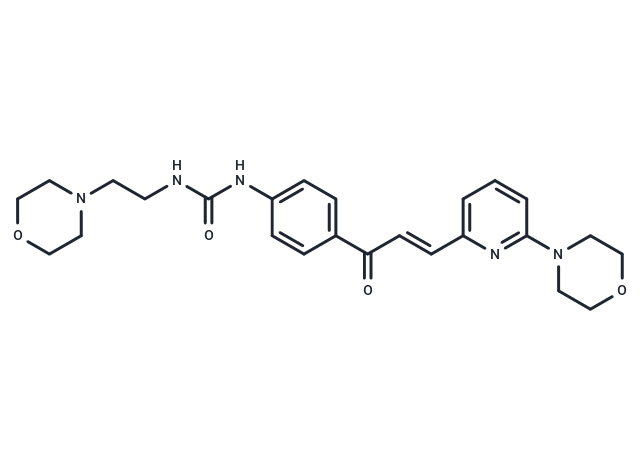Shopping Cart
- Remove All
 Your shopping cart is currently empty
Your shopping cart is currently empty

TRC051384 is a heat shock protein 70 (HSP70) inducer that reduces stroke-associated neuronal damage and increases survival in a rat model of transient ischemic stroke, activates heat shock factor-1 and leads to elevated molecular chaperone and anti-inflammatory activity, and enhances Hsp72 expression in neurons and glial cells.

| Pack Size | Price | Availability | Quantity |
|---|---|---|---|
| 1 mg | $31 | In Stock | |
| 5 mg | $73 | In Stock | |
| 10 mg | $113 | In Stock | |
| 25 mg | $222 | In Stock | |
| 50 mg | $313 | In Stock | |
| 100 mg | $455 | In Stock | |
| 200 mg | $655 | In Stock | |
| 1 mL x 10 mM (in DMSO) | $74 | In Stock |
| Description | TRC051384 is a heat shock protein 70 (HSP70) inducer that reduces stroke-associated neuronal damage and increases survival in a rat model of transient ischemic stroke, activates heat shock factor-1 and leads to elevated molecular chaperone and anti-inflammatory activity, and enhances Hsp72 expression in neurons and glial cells. |
| In vitro | TRC051384 significantly enhances HSP70B mRNA expression hundreds of times in both HeLa cells and rat primary mixed neurons in a dose-dependent fashion. Additionally, it markedly boosts HSF1 transcriptional activity and luciferase recovery upon treatment, following a dose-responsive pattern. Furthermore, TRC051384 demonstrates substantial inhibitory effects on LPS-induced TNF-α expression in the differentiated THP-1 cell line, achieving 60% inhibition at 6.25 μM and 90% inhibition at 12.5 μM [1]. |
| In vivo | Administering TRC051384 significantly diminishes stroke-related neuronal damage and disability in a rat model of transient ischemic stroke, achieving an 87% reduction in the area of the penumbra recruited to infarct and a 25% reduction in brain edema, even when treatment commences 8 hours after ischemia onset. Additionally, initiating TRC051384 treatment 4 hours post-ischemia onset notably enhances survival rates, with a 50% improvement by day 2 and a 67.3% increase by day 7. The mechanism underlying TRC051384's efficacy involves the induction of HSP70 through HSF1 activation, which amplifies chaperone and anti-inflammatory activities[1]. |
| Cell Research | HeLa cell transiently co-transfected with heat shock elements-luciferase reporter and normalization vector, β-galactosidase are treated with vehicle or TRC051384 (12.5 and 25 μM) for 4 hours. Cell lysates are then prepared and analyzed for luciferase and β-galactosidase activity[1]. |
| Alias | TRC 051384 |
| Molecular Weight | 465.54 |
| Formula | C25H31N5O4 |
| Cas No. | 867164-40-7 |
| Smiles | O=C(NCCN1CCOCC1)Nc1ccc(cc1)C(=O)\C=C\c1cccc(n1)N1CCOCC1 |
| Relative Density. | 1.260 g/cm3 (Predicted) |
| Storage | Powder: -20°C for 3 years | In solvent: -80°C for 1 year | Shipping with blue ice. | |||||||||||||||||||||||||
| Solubility Information | DMSO: 16.67 mg/mL (35.8 mM), Sonication is recommended. | |||||||||||||||||||||||||
Solution Preparation Table | ||||||||||||||||||||||||||
DMSO
| ||||||||||||||||||||||||||

Copyright © 2015-2025 TargetMol Chemicals Inc. All Rights Reserved.